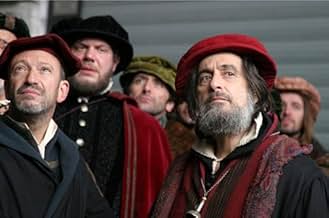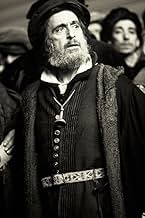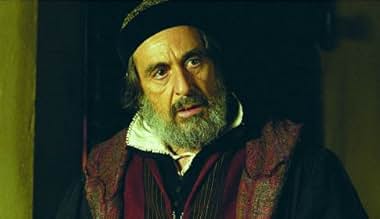In 16th century Venice, when a merchant must default on a large loan from an abused Jewish moneylender for a friend with romantic ambitions, the bitterly vengeful creditor demands a gruesome... Read allIn 16th century Venice, when a merchant must default on a large loan from an abused Jewish moneylender for a friend with romantic ambitions, the bitterly vengeful creditor demands a gruesome payment instead.In 16th century Venice, when a merchant must default on a large loan from an abused Jewish moneylender for a friend with romantic ambitions, the bitterly vengeful creditor demands a gruesome payment instead.
- Director
- Writers
- Stars
- Nominated for 1 BAFTA Award
- 2 wins & 7 nominations total
- Aragon
- (as Antonio Gil-Martinez)
- Director
- Writers
- All cast & crew
- Production, box office & more at IMDbPro
Featured reviews
Like so many of Shakespeare's great tragic heroes, Shylock continues to fascinate after 400 years because he is such a difficult and complex character. Pitiful, proud, angry, vengeful, weak, arrogant; his behaviour defies simply analysis and continues to be argued over. He is flawed not because he is a Jew, but because he is human. Rarely do modern screenwriters imbue their creations with such richly textured contradictions, and it is to everyone's benefit that we have Shakespeare to draw on for inspiration.
Shakespearean language is wild and rambling, saturated in multiple meanings, word play and metaphor. To be understood it must be wrangled and tamed by an actor with the strength and knowledge to do so. When an actor fails, the words pour forth in a torrent of incomprehensible words, but when he succeeds, the English language springs to life with an immediacy and vibrancy that takes your breath away. Al Pacino is one such actor, and here displays an incredible level of clarity and control that, were there any justice, would sweep every award in the offering. He meets the challenge of presenting Shylock head on, and delivers an extraordinarily subtle and nuanced performance. It would be a crime if we never got the opportunity to see what he does with King Lear.
The supporting cast is noteworthy. Jeremy Irons gives an original take on the familiar Antonio, presenting an older, quieter figure that displays the unsavoury contradictions between medieval chivalry and ugly prejudice of the time. Joseph Fiennes is a revelation as he matures beyond superficial eye-candy to actually inhabit a character for once. Lynn Collins is the only disappointment. Many of Shakespeare's women are underwritten and require an actor to really work hard to bring them to life, and Collins' Gwyneth Paltrow impersonation seems a little flat and unsuited to the darker tone that Radford is aiming for.
The design team must be acknowledged for creating a unique and thoroughly believable vision of Late Renaissance Venice. The city has not looked this ominous since 'Don't Look Now'. Taking full advantage of extant locations and natural light, the film has an appearance of authenticity that is greatly enhanced by the dark and timeworn costume design. All, again, are worthy of award recognition.
The financial backers of films such as this must be commended. With a budget of $30 million, they must go into such a venture in the full and certain knowledge that they will never make a profit, and yet they invest nonetheless. We can all be grateful for it, as the result is a remarkable adaptation that is sure to be a benchmark for many years to come.
From the director of the film version of 1984, Michael Radford has created a masterpiece for everyone to enjoy time and time again.
With an outstanding cast that includes Al Pacino, (Shylock) Joseph Fiennes, (Bassanio) Jeremy Irons, (Antonio) Kris Marshall (Gratiano) and Lynn Collins, (Portia); this beautiful movie is a must see for every Shakespeare enthusiast.
The story is set in 15th century Britain when many Jews were sadly persecuted in the streets for no apparent reason. Bassanio with the help of Antonio visit a wealthy Jewish loan shark called Shylock and ask if they may borrow some money so Bassanio can visit his love, Portia. Shylock agrees but demands a pound of flesh from Antonio if he can not meet his strict payment demands.
A while later Antonio can not pay the loan and Shylock demands his pound of flesh. A ferocious court battle then takes place between the two men as Antonio's friends and family gather round to await his verdict.
This is a remarkable cinematic experience with the passionate Al Pacino at his best. Also look out for the rising young star, Kris Marshall from the hit, Love Actually. He played the part of Gratiano which such emotion and dignity.
This film, which will most certainly be up for Oscars, clearly demonstrates that Shakespeare can still entertain crowds centuries from his death.
This very enjoyable film is a balance of both, tragedy and comedy. As is both delightful, disturbing and dramatically marvellous. Al Pacino delivers a wonderfully complex and dark performance. His portrayal is pretty watchable and absolutely memorable, he's a Shakespeare expert , like he proved in ¨Looking for King Richard III¨ which he starred and and directed. I found particularly nice the way the film handled the court rivalry , the antagonism between them and final result. The movie packs an evocative musical score by Jocelyn Pock(Eye wide shut) and colorful cinematography by Benoit Delhomme, director's usual cameraman. The motion picture is well directed by Michael Radford. Another adaptation about this known book are mostly made for TV, these are the following : 1973 with Laurence Olivier, Joan Plowright and Jeremy Brett ; 1980 by Jack Gold with Warren Mitchell and John Rhys Davies ; 2001 by Trevor Nunn with Henry Goodman. And by Orson Welles with Oja Kodar but was scrapped and pretended to release with other of his unfinished movies, though never completed when the negatives were mysteriously lost. I would recommend this picture to anybody interested by Shakespeare.
The situations and characters that result are extremely rich, and those are the things we notice and remember. They are rich because of the massive talent in how the small turns of phrase support the larger containing notions.
When the plays were performed in the form Shakespeare understood, there were essentially no sets or props and the actors' priorities were to convey the language. He knew nothing of the modern notion of acting where actors create characters, characters drive situations and situations define or illuminate a larger context. That's all backwards from his magical tradition.
So putting on a Shakespearian play today is a challenge of high order, at least doing it in such a way that the genius of the thing shines through. Otherwise, you have something of which we have hundreds of thousands of examples from lesser talents. It is made ever harder because actors believe Shakespeare was created for them, and actors together with other trades who appreciate their perspective control many creative decisions today.
Matters are much worse when conveying Shakespeare to film. The "language" is different bigger including a growing vocabulary of visual language. And the actors are even more unavoidable.
In "Merchant," Shakespeare's big notions had to do with deviation from law in as many forms as he could fit into the play. Foremost among these was the "law" of the dramatic form; this play famously mixes tragedy and comedy. In tragedy, the characters accidentally fall into the machinery of the universe and get ground up, often accelerated by what they "must" do. (In film that would be "noir.")
In Shakespeare's comedies, the characters understand the rules and are able to play with them without hazard for their amusement. (A film equivalent would be screwball.) So one large notion of dealing with law is the very construction of the play: two different notions of law, one within and the other without. Lynch in "Blue Velvet" would similarly have two genres as conflicting characters.
Shakespeare of course piles dozens of other problems with laws, rules and norms into his story: the Venetian legal system, religious prescriptions, and on and on, even down to the duties of a daughter in carrying out her father's eccentric will.
The magic isn't in any of this, impressive as it is. The magic comes in how he constructs the language and metaphors that dart in and out of the various issues and perspectives. Sometimes a metaphor is captured by itself. Sometimes it stands outside itself. Sometimes it even mocks or annotates itself. Its as if he created molecules that have the same lives as the galaxies and then let all the stuff in the middle (people, cities, religions) just emerge but with rich commentary on the laws of emergence.
We do have very good film adaptations of Shakespeare. "Prospero's Books" is a terrifically deep understanding of the spoken and cinematic languages and the self-reference of explicitly portraying the playwright. Branaugh's "Hamlet" appropriately subordinated images and actors (both excellent in his case) to the narrative in the language. Godard's "Lear" is also good, completely translating and discarding the language. Luhrmann's "Romeo and Juliet" takes the kinds of risks with cinematic poetry and magic the source does with language.
Now this. Much has been made of the anti-Semitism, and some about the overt homosexuality. Both are social constructions much younger than this play. For London audiences, no people they knew could be more cartoonish than Italians: foppish, superficial and lacking introspection. This play is anchored on two characters: the aging gay merchant of the title and a rich, ripe orphan virgin. Both end up in differing intrigues over love for the same pretty boy. Both intrigues involve rules, law and money and the writer has them interact.
The Jew and his daughter are secondary, no more important than the contents of the boxes and portrayed no more ruthlessly than the Italians around him. His engagement is more a device to introduce religious law outside that known to the audience. We add the anti-Semitism here, something the adapter decided to accentuate.
This is a nice movie. Everything about it is pretty. Even the modern constructions of characters by Pacino and Irons have a prettiness to them, As an ordinary movie (like say, "Amadeus") it is a reasonable filler of time if your life is lacking in prettiness.
But the source has something far richer to feed us with, the ability to be in a story and think about that story: to break our narrative eye into dozens of fairies, some of which dance outside the engagement and some that are swept along. None of that conveys here. We are instead locked into a single narrative thread, despite many cinematic techniques from others that would have allowed otherwise.
Radford chooses the gold box. We have the sex, not the love. Our ships are lost.
Ted's Evaluation -- 2 of 3: Has some interesting elements.
The text is quite stripped down with many passages cut. But, I only noticed one line which was cut at the moment when I expected to hear it - and it was replaced by a look that said it all. This economy and judicious editing has given us a gripping movie - not just a film of the play.
And at last, there is a rationale as to why Antonio is so loyal and generous to the undeserving/unrelated Bassanio - you can almost feel Antonio's pulse start to race when he catches glimpse of Bassanio passing by in a gondola, or arriving for a visit. But it is as subtle as that - no more. I was spellbound.
There were many other highlights. I felt the arguments during the trial to be heartbreaking. And, the suitors' trials are hilarious.
Add all that to glorious cinematography and costumes that resonated with the times, and you'll understand why I can't wait to see it again. And again.
Storyline
Did you know
- TriviaThe bare-breasted prostitutes were not put in the film to make it more risqué, but rather to add a note of historical authenticity. Venetian law at the time required all prostitutes to bare their breasts because the Christian authorities were concerned about rampant homosexuality in their city.
- GoofsIn Venice in 1598 a woman with no head-dress and her hair flowing loose would be taken for a whore, yet this is how Portia frequently appears.
- Quotes
Shylock: I am a Jew! Hath not a Jew eyes? hath not a Jew hands, organs, dimensions, senses, affections, passions? Fed with the same food, hurt with the same weapons, subject to the same diseases, healed by the same means, warmed and cooled by the same winter and summer, as a Christian is? If you prick us, do we not bleed? if you tickle us, do we not laugh? if you poison us, do we not die? And if you wrong us, shall we not revenge? If we are like you in the rest, we will resemble you in that. If a Jew wrong a Christian, what is his humility? Revenge. If a Christian wrong a Jew, what should his sufferance be - by Christian example? Why, revenge. The villany you teach me, I will execute, and it shall go hard - but I will better the instruction.
- Crazy creditsPROLOGUE: "Intolerance of the Jews was a fact of 16th century life even in Venice, the most powerful and liberal city state in Europe."
"By law the Jews were forced to live in the old walled foundry or 'Geto' area of the city. After sundown the gate was locked and guarded by Christians."
"In the daytime any man leaving the ghetto had to wear a red hat to mark him as a Jew."
"The Jews were forbidden to own property. Thus, they practiced usury, the practice of lending money at interest. This was against Christian law."
"The sophisticated Venetians would turn a blind eye to it but for the religious fanatics, who hated the Jews, it was another matter . . . "
- ConnectionsFeatured in 'Merchant of Venice': Shakespeare Through the Lens (2005)
- SoundtracksWith Wand'ring Steps
Composed by Jocelyn Pook, Lyrics by John Milton
Arranged by Jocelyn Pook
Performed by Baroque Strings Quartet Ensemble, featuring solo vocals by Andreas Scholl
Harp: Siobhan Armstrong
Psaltery: Harvey Brough
Lute: Elizabeth Kenny
Published by Shylock Ltd / EMI Music Publishing Ltd
© 2004 Decca Music Group Limited
(p) Jocelyn Pook Ltd. /2004 Decca Music Group Limited
Details
- Release date
- Countries of origin
- Official sites
- Languages
- Also known as
- William Shakespeare's The Merchant of Venice
- Filming locations
- Esch-sur-Alzette, Luxembourg(only Venice film set)
- Production companies
- See more company credits at IMDbPro
Box office
- Budget
- $30,000,000 (estimated)
- Gross US & Canada
- $3,765,585
- Opening weekend US & Canada
- $69,868
- Jan 2, 2005
- Gross worldwide
- $21,560,182
- Runtime2 hours 11 minutes
- Color
- Sound mix
- Aspect ratio
- 2.35 : 1
Contribute to this page











































